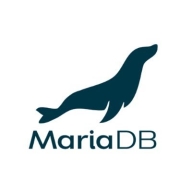

MariaDB and Amazon Aurora compete in the database category. Amazon Aurora appears to have an upper hand due to its superior cloud-integration features and managed environment efficiencies.
Features: MariaDB is known for its flexibility and ease of use, driven by its open-source nature. It supports ColumnStore and Connect Engine, enhancing analytic workloads. Users can adjust performance parameters in real-time. Amazon Aurora offers a managed environment with compatibility for MySQL and advanced features like auto-scaling and high availability. Its integration with AWS services and fault tolerance are strong advantages.
Room for Improvement: MariaDB needs better scalability, redundancy, BI tool integrations, and improved stability for handling large-scale data. Amazon Aurora could improve its pricing model, offer better performance insights, and focus more on developer needs. While AWS management is beneficial, there is room for improvement in cryptography, scalability features, and cost management.
Ease of Deployment and Customer Service: MariaDB is commonly deployed on-premises, offering ease of setup with low external support needs, relying significantly on community support. Amazon Aurora thrives in cloud environments, supported by AWS’s robust infrastructure, offering significant benefits in deployment and integration with cloud services.
Pricing and ROI: MariaDB's open-source offering reduces costs, advantageous for budget-conscious operations, although enterprise versions require licensing. Amazon Aurora is costly but cost-effective for enterprises valuing cloud features and reduced administrative efforts. Both databases offer operational efficiencies and cost savings providing significant ROI.
Using Amazon Aurora has saved us significantly in terms of manpower costs, with nearly fifty percent savings compared to an on-premises solution.
Technical support from Amazon is rated very highly.
The initial support could improve by having engineers familiarize themselves with the issue content to provide more specialized assistance from the start.
Compared to MongoDB, there are some platform deficiencies, but the support team shouldn't bear that burden.
This scalability is critical as it allows for runtime expansion, which is essential for businesses moving from on-premises to the cloud.
It offers a stable environment, ensuring consistent performance.
We haven't found issues with the stability of MariaDB.
There are technical challenges, such as the inability to provision the database using a PostgreSQL snapshot directly.
Keeping extensions up-to-date with PostgreSQL releases would enhance Aurora's functionality.
I used the backup options in Amazon Aurora for cloning databases. It's very common.
MariaDB is scalable and easy to scale.
The pricing for Amazon Aurora is different from DocumentDB because DocumentDB is cheaper.
The pricing is reasonable and not overly expensive.
Amazon Aurora is not very expensive as other solutions with similar features from other vendors come at almost the same cost.
MariaDB is in the pricey range, especially for huge databases handling terabytes of data.
It replicates data across multiple Availability Zones, ensuring high availability and geographical redundancy, which can be considered a GR instead of a DR.
Amazon Aurora offers a 99.9% SLA compared to PostgreSQL. This ensures a high level of availability for our applications.
Configuration, setup, and schema design are good features in MariaDB.
| Product | Market Share (%) |
|---|---|
| MariaDB | 5.7% |
| Amazon Aurora | 2.7% |
| Other | 91.6% |


| Company Size | Count |
|---|---|
| Small Business | 5 |
| Midsize Enterprise | 4 |
| Large Enterprise | 13 |
| Company Size | Count |
|---|---|
| Small Business | 27 |
| Midsize Enterprise | 12 |
| Large Enterprise | 25 |
Amazon Aurora is a MySQL and PostgreSQL-compatible relational database built for the cloud, that combines the performance and availability of traditional enterprise databases with the simplicity and cost-effectiveness of open source databases.
Amazon Aurora is up to five times faster than standard MySQL databases and three times faster than standard PostgreSQL databases. It provides the security, availability, and reliability of commercial databases at 1/10th the cost. Amazon Aurora is fully managed by Amazon Relational Database Service (RDS), which automates time-consuming administration tasks like hardware provisioning, database setup, patching, and backups.
Amazon Aurora features a distributed, fault-tolerant, self-healing storage system that auto-scales up to 64TB per database instance. It delivers high performance and availability with up to 15 low-latency read replicas, point-in-time recovery, continuous backup to Amazon S3, and replication across three Availability Zones (AZs).
Visit the Amazon RDS Management Console to create your first Aurora database instance and start migrating your MySQL and PostgreSQL databases.
MariaDB is an open source relational database created by the original founders of MySQL. It is considered one of the most popular and trusted database servers throughout the world. MariaDB is a valued component found in most cloud offerings and is the default in many Linux tools. It is also widely used by Wikipedia, WordPress, and Google, among other well-known sites. Maria DB easily melds data into concise information from a vast array of applications, such as banking, online shopping, websites, and more.
MariaDB was originally created to improve MySQL performance. It is the most widely chosen database server due to the solution being super fast, robust, user-friendly, and easily scalable. MariaDB also offers a substantial ecosystem of plugins, storage engines, and numerous other valuable tools that make it very attractive for a significant offering of use cases.
The solution’s newest functionalities include compatibility with Oracle Database and Temporal Data Tables, and advanced clustering with Galera Cluster 4, which make it easier for users to research data history from any point in the past. Additionally, the most recent versions include JSON and GIS features. MariaDB is committed to staying an open source solution.
MariaDB Features
Reviews from Real Users
Faustine C., Engineering Supervisor- Corporate Data Solutions and Services at TZ Telecoms Corporation, shares, “The software provides a lot of information on what is happening inside the database. For most performance parameters it is easy to know if something is not right in the configuration or optimization which helps engineers take remedial fine-tuning measures. For example, if the database is underperforming it is easy to know which performance parameter can be adjusted to handle the workload. It is difficult to troubleshoot database issues if many performance parameters can not be monitored or debugged which is the case with some database management systems. It provides great monitoring of data storage, processing, and performance stability which is really important for real-time data storage and processing. It's a user-friendly product.”
A PeerSpot user who is a Senior Engineer at a tech services company relates, “ The solution's high availability is its most valuable aspect. We have found the product to be stable and the initial setup is pretty simple. I'd rate the solution at a ten out of ten. I'm very happy with it overall. I would recommend the solution to others. It's easy to find details about the product online and to learn about it.”
We monitor all Relational Databases Tools reviews to prevent fraudulent reviews and keep review quality high. We do not post reviews by company employees or direct competitors. We validate each review for authenticity via cross-reference with LinkedIn, and personal follow-up with the reviewer when necessary.